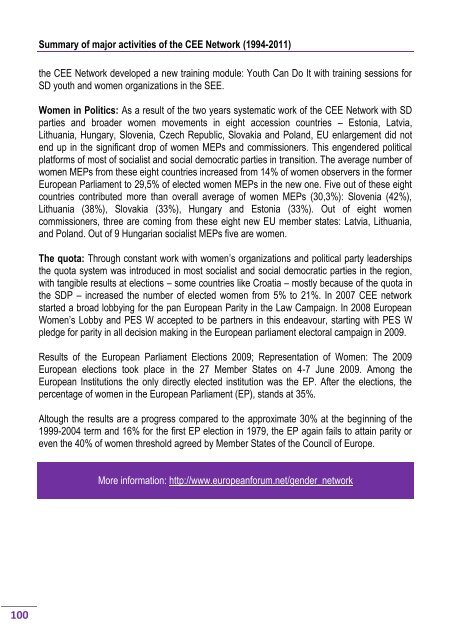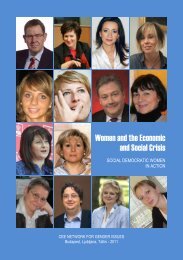Importance of women's political empowerement - Gurmai Zita
Importance of women's political empowerement - Gurmai Zita
Importance of women's political empowerement - Gurmai Zita
Create successful ePaper yourself
Turn your PDF publications into a flip-book with our unique Google optimized e-Paper software.
100<br />
Summary <strong>of</strong> major activities <strong>of</strong> the CEE Network (1994-2011)<br />
the CEE Network developed a new training module: Youth Can Do It with training sessions for<br />
SD youth and women organizations in the SEE.<br />
Women in Politics: As a result <strong>of</strong> the two years systematic work <strong>of</strong> the CEE Network with SD<br />
parties and broader women movements in eight accession countries – Estonia, Latvia,<br />
Lithuania, Hungary, Slovenia, Czech Republic, Slovakia and Poland, EU enlargement did not<br />
end up in the significant drop <strong>of</strong> women MEPs and commissioners. This engendered <strong>political</strong><br />
platforms <strong>of</strong> most <strong>of</strong> socialist and social democratic parties in transition. The average number <strong>of</strong><br />
women MEPs from these eight countries increased from 14% <strong>of</strong> women observers in the former<br />
European Parliament to 29,5% <strong>of</strong> elected women MEPs in the new one. Five out <strong>of</strong> these eight<br />
countries contributed more than overall average <strong>of</strong> women MEPs (30,3%): Slovenia (42%),<br />
Lithuania (38%), Slovakia (33%), Hungary and Estonia (33%). Out <strong>of</strong> eight women<br />
commissioners, three are coming from these eight new EU member states: Latvia, Lithuania,<br />
and Poland. Out <strong>of</strong> 9 Hungarian socialist MEPs five are women.<br />
The quota: Through constant work with women’s organizations and <strong>political</strong> party leaderships<br />
the quota system was introduced in most socialist and social democratic parties in the region,<br />
with tangible results at elections – some countries like Croatia – mostly because <strong>of</strong> the quota in<br />
the SDP – increased the number <strong>of</strong> elected women from 5% to 21%. In 2007 CEE network<br />
started a broad lobbying for the pan European Parity in the Law Campaign. In 2008 European<br />
Women’s Lobby and PES W accepted to be partners in this endeavour, starting with PES W<br />
pledge for parity in all decision making in the European parliament electoral campaign in 2009.<br />
Results <strong>of</strong> the European Parliament Elections 2009; Representation <strong>of</strong> Women: The 2009<br />
European elections took place in the 27 Member States on 4-7 June 2009. Among the<br />
European Institutions the only directly elected institution was the EP. After the elections, the<br />
percentage <strong>of</strong> women in the European Parliament (EP), stands at 35%.<br />
Altough the results are a progress compared to the approximate 30% at the beginning <strong>of</strong> the<br />
1999-2004 term and 16% for the first EP election in 1979, the EP again fails to attain parity or<br />
even the 40% <strong>of</strong> women threshold agreed by Member States <strong>of</strong> the Council <strong>of</strong> Europe.<br />
More information: http://www.europeanforum.net/gender_network



